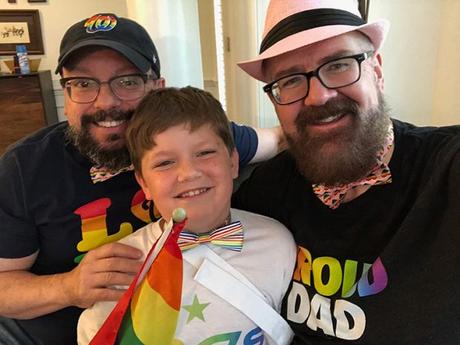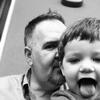 Pride this year didn't go quite like I'd hoped.
Pride this year didn't go quite like I'd hoped. When you're a parent, things don't always hardly ever work out as planned. You'd think after almost 10 years I would have figured that out, but I guess hope springs eternal. Especially when it comes to parades full of rainbows and glitter.
2019 marks the 50 th anniversary of the Stonewall Riots - the event widely regarded as the start of the modern LGBTQ rights movement. So Pride is a big deal this year. And as always, DC's pride celebration fell on the weekend closest to my birthday... which this year also marked the 50 th anniversary of ME!
But alas the universe had other ideas.
Early Saturday morning, Papa woke up feeling all kinds of icky, so he took himself to the urgent care clinic to make sure it wasn't anything serious. Turns out it was just a virus of some sort - but it was contagious, and he needed to stay home. I was bummed to miss out, but hesitant to brave the chaos of the Pride parade as a solo parent. I instead took Jon to hang out with his cousins in Virginia, giving Papa time to rest. At least we still had the street festival on Sunday.
The next day, Jon got up complaining about a sore arm from a scooter spill he took Friday afternoon. Visibly unscathed, I'd given it time to heal on its own. Yet since he was actually requesting to see a doctor, I figured it warranted a visit. Thus the first half of Sunday was spent back at the urgent care clinic, getting x-rays, a sling, and a prescription for my 9-year-old to take it easy.
The entire weekend was a wash, and I wasn't having it. Not only was I not getting to hang out with the partying masses and show off my adorable family, but also our Pride-themed outfits were going to waste! My agitation only grew as I scrolled through social media, seeing everyone reveling and rainbowing their asses off at the parade, street festival, concerts and parties.
Amidst all my pissyness and FOMO-ing, I was struck by a hard truth. Fifty years ago, I wouldn't have had a husband, in sickness or in health. I also wouldn't have had a child I'd legally adopted with said husband to care for. And I wouldn't have had an entire weekend celebrating my identity, my sexuality, and my family that I was sad to miss.
Sure, I'm disappointed I didn't get to join the throngs downtown, but the universe's message to me was clear. I'm living a life that so many have struggled, fought, and died for, and I can't be anything but grateful.
I'm proud, I'm grateful, and I'm hopeful. But the work of my wonderful, colorful community is far from over. Trans people, LGBTQ people of color, and queer youth continue to suffer and die at the hands of hate groups, our current administration, and those that support it. And they continue to suffer and die when well-intentioned progressives - even gay ones - do nothing.
As you celebrate Pride this month - and as a birthday present to me - I encourage you to help support the LGBTQ+ community in real, meaningful ways. I love seeing all of the rainbow-themed photos on social media, the queer-positive/inclusive ads from organizations and businesses, and all the other ways people are celebrating. But please don't forget to give back as you are able - to help the most marginalized among us.
That's something to really be proud of.
Below are just a few of my favorite organizations helping those that need it most. Give, share, repeat.
Casa Ruby is a multicultural community center that provides life-saving services for the most vulnerable in the LGBTQ community: transgender, gender queer, and gender non-conforming GLB people. Services include support groups, housing referrals, hot meals, clothing exchange, case management and legal counseling.
Comfort Cases was founded by two gay fathers (one a former foster kid) who adopted four children from foster care, inspired to ensure no other kids came to a new home carrying their belongings in a trash bag. The organization provides overnight bags, toiletries, books and other personal items to kids in the foster care system.
The Stonewall Inn Gives Back Initiative supports sister organizations located across the nation and especially those serving in rural communities where progress toward equality has been slow and daily discrimination, harassment, higher rates of suicide, substance abuse and depression are often a way of life.

comments

